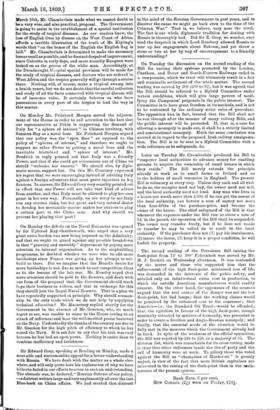The second reading of the Petroleum Bill raising the flash-point
from 73 to 100° Fahrenheit was moved by Mr. H. J. Reckitt on Wednesday afternoon. It was contended by the mover and those who supported him that the enforcement of the high flash-point minimised loss of life, was demanded in the interests of the public safety, and entailed only an infinitesimal extra cost in production, to which the outside American manufacturers would readily consent. On the other hand, the opponents of the measure argued that the real source of the danger was not the low flash-point, but bad lamps ; that the working classes would be penalised by the enhanced cost to the consumer ; that America—i.e., the Standard Oil Trust—would be offended ; that the agitation in favour of the high flash-point, though nominally actuated by motives of humanity, was promoted in order to create a Scottish and Anglo-Russian monopoly ; and finally, that the essential needs of the situation would be fully met in the measure which the Government already had in hand. In spite of the weakness of the official opposition, the Bill was rejected by 244 to 159, or a majority of 85. The division list, which was remarkable for its cross-voting, made it clear that other influences beside the ties of party and the call of humanity were at work. To pillory those who voted against the Bill as "champions of Murder-oil" is grossly unjust, in view of the fact that more British capitalists are interested in the raising of the flash-point than in the main- tenance of the present system.






































 Previous page
Previous page